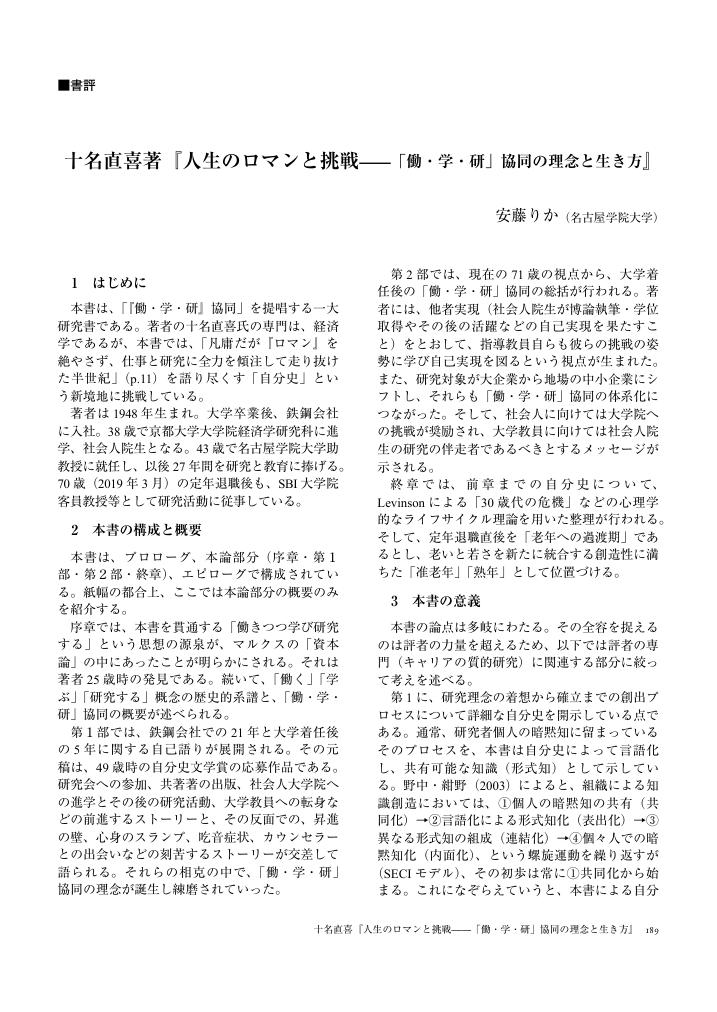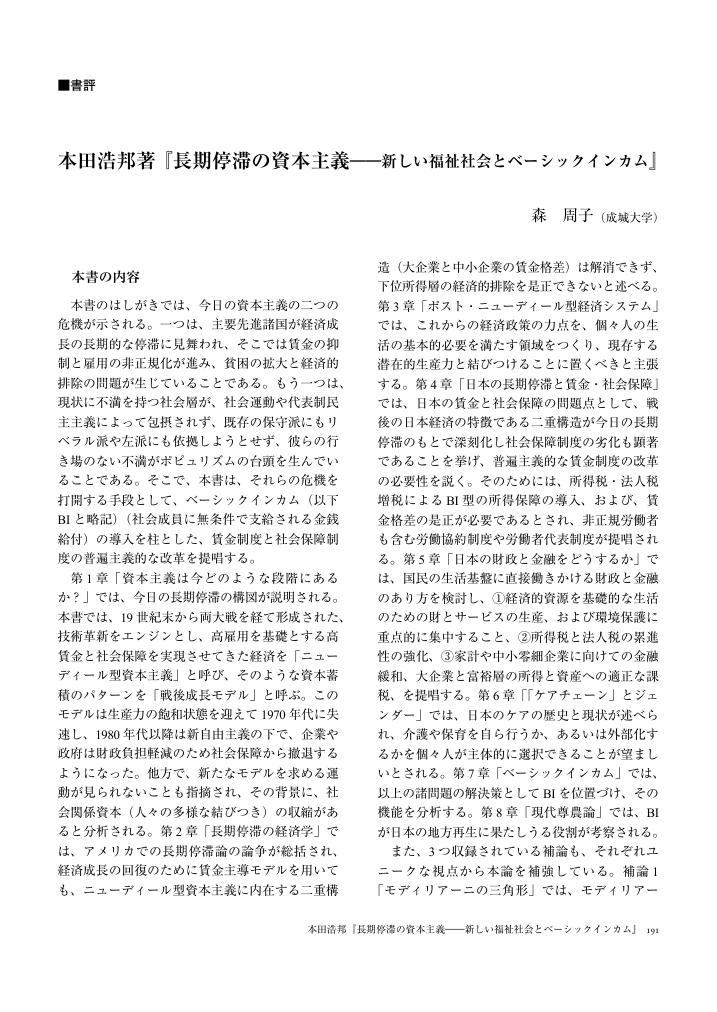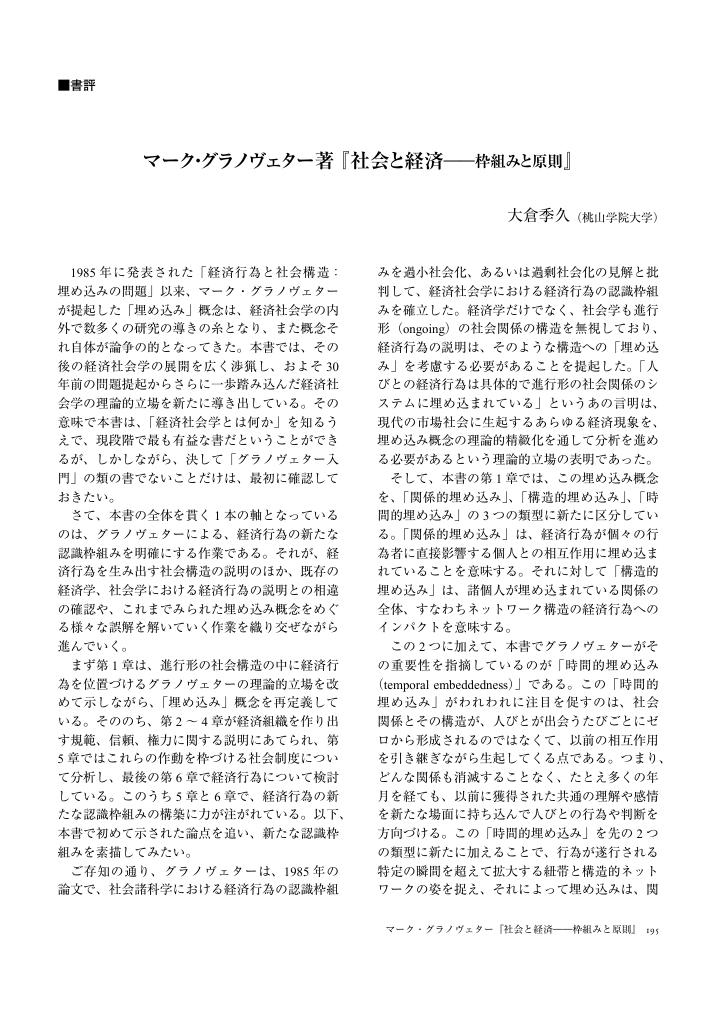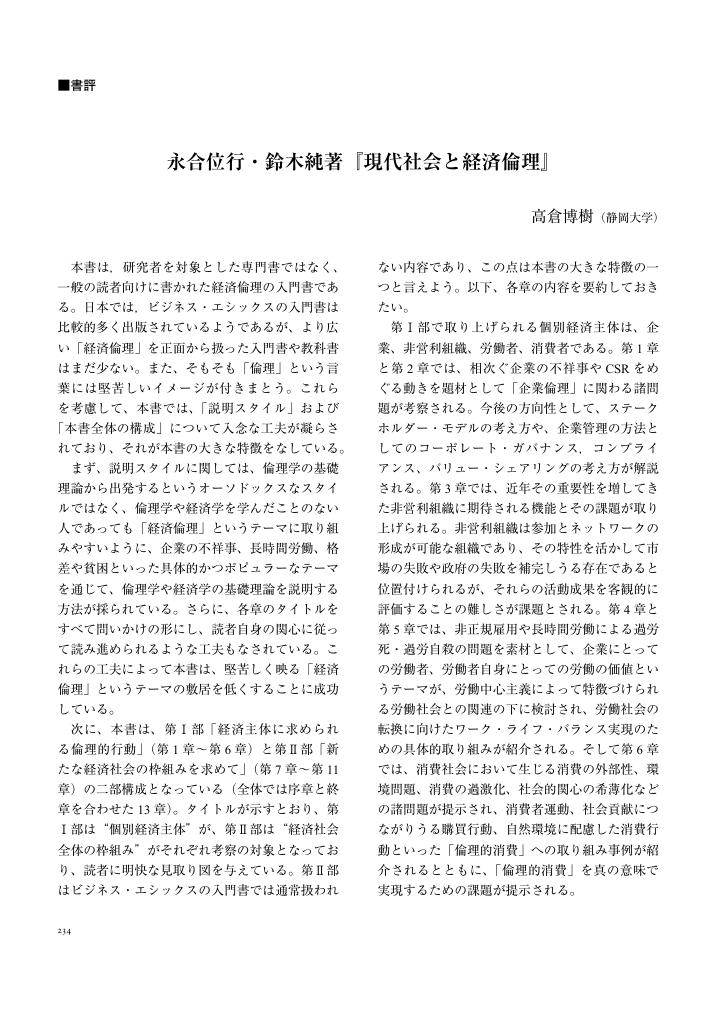2 0 0 0 経済社会学と「社会の理論」プロジェクト
- 著者
- 馬場 靖雄
- 出版者
- 経済社会学会
- 雑誌
- 経済社会学会年報 (ISSN:09183116)
- 巻号頁・発行日
- vol.37, pp.10-20, 2015
2 0 0 0 社会理論の二人の巨人:ハイエクとルーマン
- 著者
- 森田 雅憲
- 出版者
- 経済社会学会
- 雑誌
- 経済社会学会年報 (ISSN:09183116)
- 巻号頁・発行日
- vol.38, pp.4-10, 2016
1 0 0 0 OA T.H.グリーンの社会改革思想 人格完成のための政策を正当化する「自由」
- 著者
- 竹口 隼人
- 出版者
- 経済社会学会
- 雑誌
- 経済社会学会年報 (ISSN:09183116)
- 巻号頁・発行日
- vol.43, pp.89-100, 2021 (Released:2022-11-27)
This paper examines the social reform thought of Thomas Hill Green (1836-1882), a nineteenth-century British philosopher and a representative of British idealism. Based on Green's theories of freedom and the state, I examine his justification for government interference in social affairs in the latter half of the nineteenth century and its basis, and clarify the relationship between freedom and interference in Green's social reform thought. In Green, freedom means the capacity to achieve what is worth doing. What is worthy is the perfection of the person, which is also the common good worthy of all others. As a means of this freedom, in the sense of having the capacity to realize such perfection of the person, various freedoms such as freedom of contract are positioned. Each person also has rights by virtue of being recognized by others as capable of contributing to the common good, which is recognized by all. This allows everyone the capacity to achieve perfect, the capacity in freedom. Since all people must be able to be free, the state has a role to realize freedom in the sense of having the capacity to realize what is worth. Since the perfection of the person is a moral duty of each individual, it is not the role of the state to enforce it. The role of the state is to maintain the conditions for human freedom by removing the obstacles that prevent each person from realizing and shaping his or her capacity to do something worthy. Hence, in the interference of the state, the question becomes what and how is an obstacle to the perfection of the personality. In the sense that the role of the state is limited to the removal of obstacles to freedom and the maintenance of the conditions of freedom, it takes the form of a prior intervention, an interference with the conditions under which each person is able to perform, and these are the role of the state.
1 0 0 0 OA 消費文化の情報化と社会の持続可能性 新しい生活様式を中心に
- 著者
- 水原 俊博
- 出版者
- 経済社会学会
- 雑誌
- 経済社会学会年報 (ISSN:09183116)
- 巻号頁・発行日
- vol.43, pp.5-14, 2021 (Released:2022-11-27)
- 著者
- 澤田 景子
- 出版者
- 経済社会学会
- 雑誌
- 経済社会学会年報 (ISSN:09183116)
- 巻号頁・発行日
- vol.42, pp.84-96, 2020 (Released:2021-04-01)
A group interview survey was conducted on 15 women in their thirties to fifties who are currently in double care or have experience in the past to make a concrete examination of the support system and development based on the needs of double care parties. From the analysis results, it was found that the double care parties want to realize a “care balance that stabilizes the life of the whole family” by providing support and continuous external services to improve self-help ability. It is desirable to build a model of institutional support and cooperation/collaboration allows various sections to develop integrally while sharing issues and purposes. In addition, it is necessary to improve the process leading to the use of services, to provide an early and continuous intervention of a cross-sectional consultation support team, and to support an environment in which the family can share the responsibility and role of care.
- 著者
- 礒井 純充
- 出版者
- 経済社会学会
- 雑誌
- 経済社会学会年報 (ISSN:09183116)
- 巻号頁・発行日
- vol.42, pp.97-109, 2020 (Released:2021-04-01)
In recent years, the number of “elderly housing with life support service (hereinafter, this is called “elderly housing”)” has been increased under subsidiary programs supported by the national government. NTT Urban Development Corporation has promoted a project to build an apartment for rent and an elderly housing in the same area, which could realize multi-generational community there. Furthermore, in order to forge local community, a micro library called “machi-library” has been set up in a cafe anyone can access to, which has been established in the elderly housing. This thesis aims to provide analysis of how the machi-library influences the residents' social behavior and mindset, especially focusing on community ties in the elderly housing area, and what roles this machi-library plays there. I performed a series of methods to verify my study: analyzing observations on the library, taking a survey from the users (both residents and non-residents) and monitoring, and hearing with the developers. As a result, I have found that forging community ties in the elderly housing requires an environment with no social roles/status nor special interests involved. No matter how you old, people tend to look for relationships not being bothered with social roles/status nor special interests; however, their social activities have been reduced due to decreased strength with aging. Therefore, the elderly people who have less opportunity to meet people, have expected the library as a place for an encounter other than social welfare staff. Considering the situation, I have found that a “community hub,” a person facilitating communications among people should play a very important role to function the community. Additionally, the developer has evaluated the idea that deploying micro libraries to their commodities should be profitable from the business point of view. To sum up, it is clear that investments to community facilities and its human resources in elderly housings could contribute to building customer satisfaction with residents and promote their commodities in the market. In addition to this, micro libraries should play a focal role to forge open community in society.
- 著者
- 戸川 和成
- 出版者
- 経済社会学会
- 雑誌
- 経済社会学会年報 (ISSN:09183116)
- 巻号頁・発行日
- vol.42, pp.171-188, 2020 (Released:2021-04-01)
This research clarifies the situation of collaboration between local governments and civil society organizations in 23 wards of Tokyo and the impact of them to citizen's efficacy toward local public policy. The downtown area of the 23 wards of Tokyo has a denser population than other areas. And the burden on the local governments are greater in the overcrowded downtown area than in other areas. Because of this local situations, civil society organizations are working with the administration to supplement the provision of public services.
1 0 0 0 OA 書評 十名直喜 著『人生のロマンと挑戦——「働・学・研」協同の理念と生き方』
- 著者
- 安藤 りか
- 出版者
- 経済社会学会
- 雑誌
- 経済社会学会年報 (ISSN:09183116)
- 巻号頁・発行日
- vol.42, pp.189-190, 2020 (Released:2021-04-01)
1 0 0 0 OA 書評 本田浩邦 著『長期停滞の資本主義――新しい福祉社会とベーシックインカム』
- 著者
- 森 周子
- 出版者
- 経済社会学会
- 雑誌
- 経済社会学会年報 (ISSN:09183116)
- 巻号頁・発行日
- vol.42, pp.191-192, 2020 (Released:2021-04-01)
1 0 0 0 OA 書評 山田秀 著『人間と社会──自然法研究』
- 著者
- 永合 位行
- 出版者
- 経済社会学会
- 雑誌
- 経済社会学会年報 (ISSN:09183116)
- 巻号頁・発行日
- vol.42, pp.193-194, 2020 (Released:2021-04-01)
1 0 0 0 OA 書評 マーク・グラノヴェター 著/渡辺深 訳『社会と経済――枠組みと原則』
- 著者
- 大倉 季久
- 出版者
- 経済社会学会
- 雑誌
- 経済社会学会年報 (ISSN:09183116)
- 巻号頁・発行日
- vol.42, pp.195-196, 2020 (Released:2021-04-01)
1 0 0 0 OA 書評 永合位行·鈴木純 著『現代社会と経済倫理』
- 著者
- 高倉 博樹
- 出版者
- 経済社会学会
- 雑誌
- 経済社会学会年報 (ISSN:09183116)
- 巻号頁・発行日
- vol.41, pp.234-235, 2019 (Released:2021-09-10)
- 著者
- 森 周子
- 出版者
- 経済社会学会
- 雑誌
- 経済社会学会年報 (ISSN:09183116)
- 巻号頁・発行日
- vol.41, pp.236-237, 2019 (Released:2021-09-10)
1 0 0 0 OA 書評 三浦まり 編『社会への投資——〈個人〉を支える〈つながり〉を築く』
- 著者
- 宮垣 元
- 出版者
- 経済社会学会
- 雑誌
- 経済社会学会年報 (ISSN:09183116)
- 巻号頁・発行日
- vol.41, pp.238-239, 2019 (Released:2021-09-10)
1 0 0 0 OA 書評 十名直喜 著『企業不祥事と日本的経営——品質と働き方のダイナミズム』
- 著者
- 山本 圭三
- 出版者
- 経済社会学会
- 雑誌
- 経済社会学会年報 (ISSN:09183116)
- 巻号頁・発行日
- vol.41, pp.240-241, 2019 (Released:2021-09-10)
1 0 0 0 OA 音楽が紡ぎ出す社会のハーモニー コミュニティ音楽療法による地域支援の試み
- 著者
- 木村 博子
- 出版者
- 経済社会学会
- 雑誌
- 経済社会学会年報 (ISSN:09183116)
- 巻号頁・発行日
- vol.42, pp.5-13, 2020 (Released:2021-04-01)
In the age of globalism, to live together with diverse people is a pressing issue. However, the growing disparity of society due to economic inequality makes it more difficult to realize. Music therapy has aimed to help people with disabilities to play a more active part in society since the 1980s. Community Music Therapy emerged in Europe with the aim of changing not people but society in general in order to be more accessible for those with disabilities. Community Music Therapy applies principles of social justice and equality and works within communities in order to realize an inclusive society through “Musicking.” Musicking is an innate ability of human being to perform music, regardless of talent or musical skills. It involves not only the performance of and listening to music but also various activities that enable music to happen, including management of concerts, advertising of music events, backstage work and so on. Community Music Therapy aims to convey the voices of people who suffer from exclusion and isolation to society and its policy lies in the belief that every human being has right to live with dignity without been excluded from community. It can be defined as a (small) social change for creating a more free and equal society through music, which is a pleasant medium for all.
- 著者
- 加藤 壮一郎
- 出版者
- 経済社会学会
- 雑誌
- 経済社会学会年報 (ISSN:09183116)
- 巻号頁・発行日
- vol.42, pp.14-23, 2020 (Released:2021-04-01)
1 0 0 0 OA 断酒会における当事者の絆とその形成要因
- 著者
- 豊山 宗洋
- 出版者
- 経済社会学会
- 雑誌
- 経済社会学会年報 (ISSN:09183116)
- 巻号頁・発行日
- vol.42, pp.27-33, 2020 (Released:2021-04-01)
1 0 0 0 OA 東南アジアにおける金融互助 フィリピン、インドネシア、タイ
- 著者
- 恩田 守雄
- 出版者
- 経済社会学会
- 雑誌
- 経済社会学会年報 (ISSN:09183116)
- 巻号頁・発行日
- vol.42, pp.37-52, 2020 (Released:2021-04-01)











